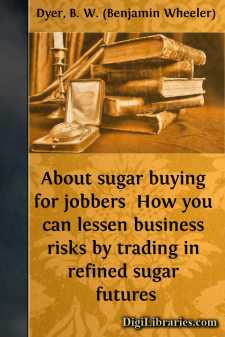Categories
- Antiques & Collectibles 13
- Architecture 36
- Art 48
- Bibles 22
- Biography & Autobiography 813
- Body, Mind & Spirit 142
- Business & Economics 28
- Children's Books 17
- Children's Fiction 14
- Computers 4
- Cooking 94
- Crafts & Hobbies 4
- Drama 346
- Education 46
- Family & Relationships 57
- Fiction 11829
- Games 19
- Gardening 17
- Health & Fitness 34
- History 1377
- House & Home 1
- Humor 147
- Juvenile Fiction 1873
- Juvenile Nonfiction 202
- Language Arts & Disciplines 88
- Law 16
- Literary Collections 686
- Literary Criticism 179
- Mathematics 13
- Medical 41
- Music 40
- Nature 179
- Non-Classifiable 1768
- Performing Arts 7
- Periodicals 1453
- Philosophy 64
- Photography 2
- Poetry 896
- Political Science 203
- Psychology 42
- Reference 154
- Religion 513
- Science 126
- Self-Help 84
- Social Science 81
- Sports & Recreation 34
- Study Aids 3
- Technology & Engineering 59
- Transportation 23
- Travel 463
- True Crime 29
About sugar buying for jobbers How you can lessen business risks by trading in refined sugar futures
Categories:
Description:
Excerpt
About Sugar Buying
Jobbers who have had considerable experience in exchange operations will find in this booklet a simplified and non-technical description of activities with which they may be in general familiar.
We believe, however, that the inauguration of trading in refined sugar futures on the New York Coffee and Sugar Exchange, Inc., throws open a new realm of opportunity.
We have attempted to outline briefly the chief advantages to be gained by a jobber's use of this new market, assuming that those who have in the past dealt in raw sugar as a protection for their refined sugar needs will welcome suggestions as to the benefits to be derived from trading directly in refined sugar.
Time, the Croupier of Business
Like a croupier at a vast roulette table, Time presides over the realm of business.
Time is the tap-root of most business uncertainties.
No one can tell what will happen a year, a month, a day, a minute from now—the future may bring floods and wars, pestilence and drouth; or it may bring great crops and fair weather, happiness and prosperity.
As business has become more and more complicated, the time element has become larger and larger. The time element as we know it does not exist in simple barter—a man weaves a piece of cloth and exchanges it for a bushel of corn: time is of no account in the transaction. A small jobber located in the same territory as refiners buys a small amount of sugar today and distributes it to his trade the next—time is negligible. A large jobber, buying perhaps for several branch houses, or located at points which necessitate a delay of two or three weeks in transit, may find it necessary even on a declining market to purchase a considerable amount of sugar, and, as a result, weeks may go by before his sugar arrives and is sold—time is vitally important.
Time is an element in costs and prices, because over any extended period of time many things may happen to influence costs and prices.
All business planning must deal with Time.
To the unenlightened business man, Time is a bugaboo—a gambler whose cards are stacked and against whom there is no defense. Such a man conducts his business from hand to mouth, in constant fear. He is a fatalist, taking his profits and losses as if they were gifts or blows of Fortune.
The enlightened man works with Time as an impartial, exacting, inevitable power for his own good or ill. He shapes his actions and enlists the services of Time to prevent catastrophe on the one hand, and to enforce prosperity and happiness on the other. Storms may come, but so far as his mind may control it, he is "the master of his fate."
Cost and Selling Prices
That the element of TIME is important in the jobber's business no one will deny. He does not base his selling price on cost, but rather on the market price. Regardless of his cost, he must sell to meet competition. It is equally obvious that the larger his business, or the greater his distance from the source of supplies, the more important part TIME plays in both his cost and selling prices....


